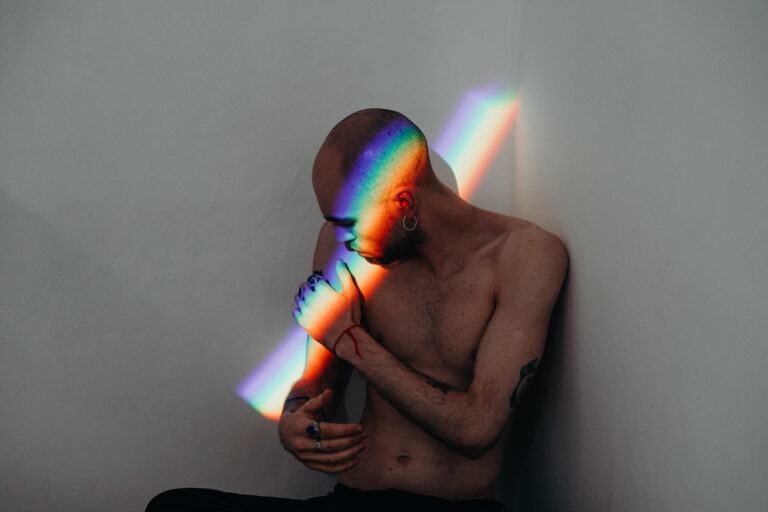What is abrosexuality? We asked abrosexual people to explain

The LGBTQIA+ community is vast—it includes a plus sign for a reason. Identities that have never been represented or celebrated before are now making their way into the cultural conversation. More and more diversified identities have surfaced throughout time and better aid queer individuals to have accurate representation. Terms like demisexual, asexual and pansexual (to name a few) have positively expanded sexual and romantic identity and yet are not celebrated in the mainstream. One of those underrepresented is abrosexuality. Here’s everything you need to know.
What is abrosexuality?
Abrosexuality is a term used to define an individual’s sexuality that is fluid or often in flux. This meaning is derived from its namesake the Greek word ‘abro’—derived from the ancient Greek word and translating to ‘delicate’—the term has come to symbolise the constant flow of movement and change in abrosexual people. The core of the identity is that a person’s sexuality changes throughout their life.
For example, an abrosexual individual may be sexually or romantically attracted to men for a period of time and then perhaps not some weeks later; the intensity of that attraction also varies. It is important to note that there is no one definitive timeline to which these changes occur. This flux of attraction could change over days, weeks, months or even years for some abrosexual people. It really just depends on the person.
The actual attractions also vary from person to person. Gay Times writes that “some may be fluid between all or a vast number of different sexualities and for others, it might not be as many. For example, one individual may only fluctuate between gay, pansexual and asexual, while another can fluctuate between them all. Also, the intensity of the attraction or the way someone feels attraction could change, too.”
Abrosexuality is not the same as being bi or pan
In the process of researching this breakdown, Screen Shot spoke to users of the subreddit r/Abrosexual (which hosts over 1,600 members) to discuss some of the misconceptions and hardships abrosexual people often face. One member, oliviakim_3874, explained that abrosexuality’s validity, as being its own identity, is often reduced by the comparisons that are made to other sexualities, “Some people say all sexualities are fluid or [that] we’re just pansexual.”
Another user, Asexual_Rock, also disclosed that, “Abrosexuality would fall under the pansexual umbrella, but pansexuality is being attracted to every gender at once. Abrosexuality is a shifting sexuality, and while you can shift pansexual, some people can be ‘triabrosexual’; meaning they only shift between three sexualities and may not shift pansexual.”
Abrosexuality is a sexual identity that differs from that of pansexuality; individuals who are pansexual are those who find attraction in all people regardless of their gender, identity or sexuality. Unlike pansexual people, an abrosexual’s attraction is in flux—they have moments in their lives where they are pansexual but also times where they are not. They may even be heterosexual for a period and then asexual. It changes—this is what defines them.
Asexual_Rock explained to Screen Shot “several misconceptions, one being that ‘abrosexuality is just a fluid bisexual identity’. This is not true—abro people can shift aromantic or asexual—which is not bisexual (unless you’re abroromanitc or abrosexual and aromantic).” Oliviakim_3874 continued, “We have a specific name [because] having a fluid sexuality is not the same [as] other sexualities.”
This can create some hardships for abrosexual people, “If your orientation changes abruptly and you don’t have a specific fixed sexuality… it would be hard to have a relationship if your romantic orientation is abrosexual too.” Asexual_Rock felt the same, “It’s difficult to to find anyone who can understand abrosexuality. You may find someone you love, but since we have shifting sexualities, we may fall out of love with that one person.”
User bestiedrinksomewater divulged to Screen Shot that “finding people who accept you and don’t judge you for being who you are has been quite the struggle for me personally. More awareness [would] mean fewer people feeling as if they are not valid or alone.”
Society’s misunderstanding and lack of knowledge of the identity is why oliviakim_3874 also believes true representation to be important, “All sexualities are equal and so is abrosexuality. It should deserve more awareness like other ones too.” The term and its accompanying five-colour flag—both thought to have originated on DeviantArt in 2013 and later becoming popular on Tumblr—is “just as important as heterosexuality, homosexuality, bisexuality etc. Basically we are all of these identities…we are human as well, we are kind of left out of the community,” Asexual_Rock writes.




